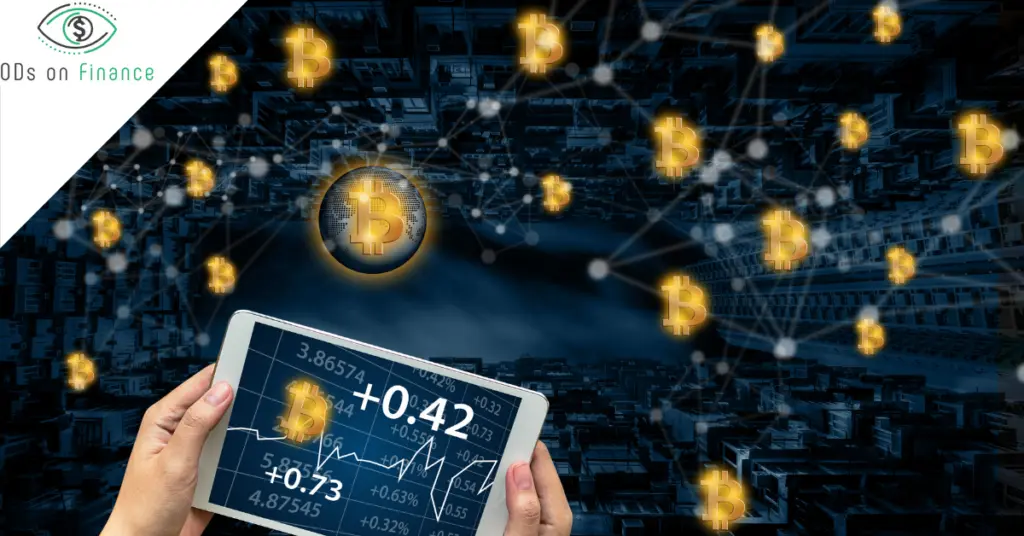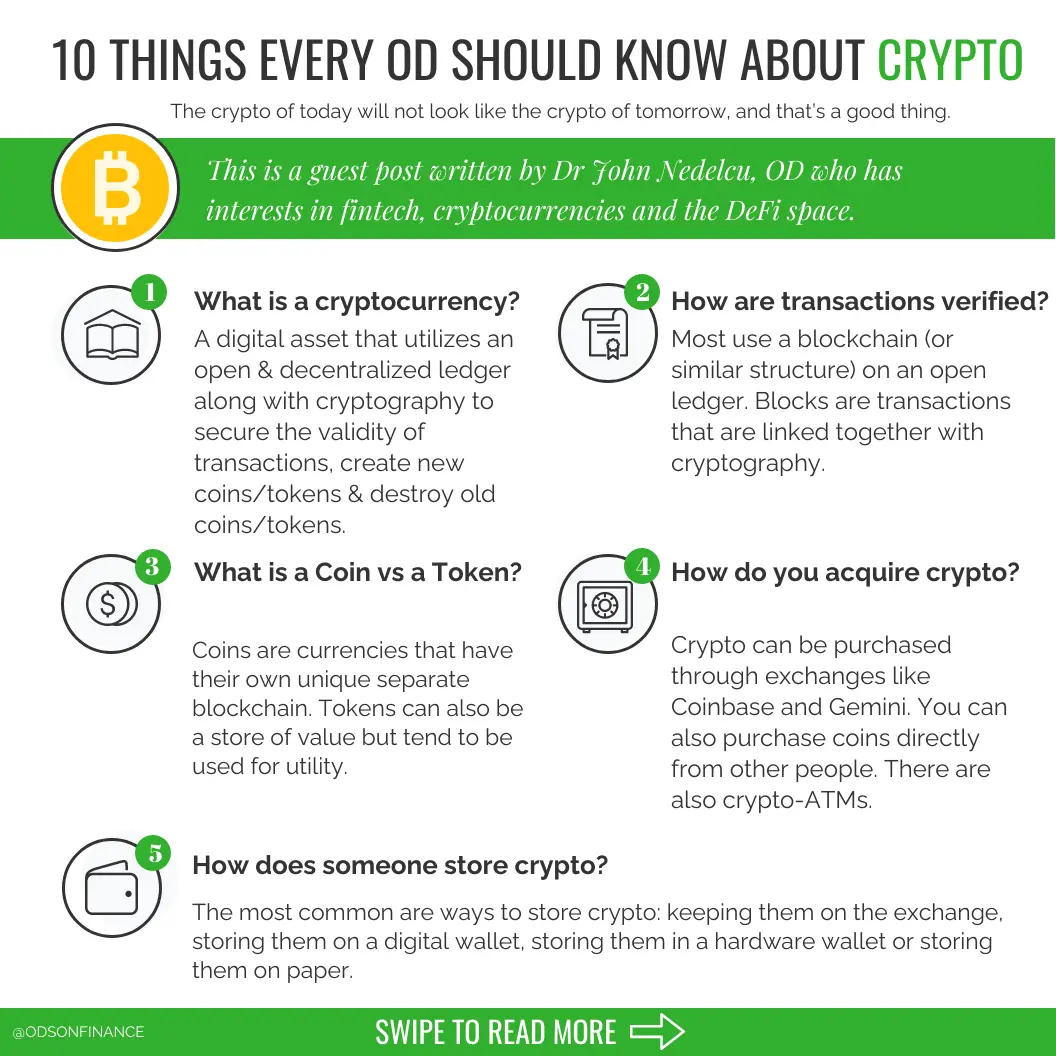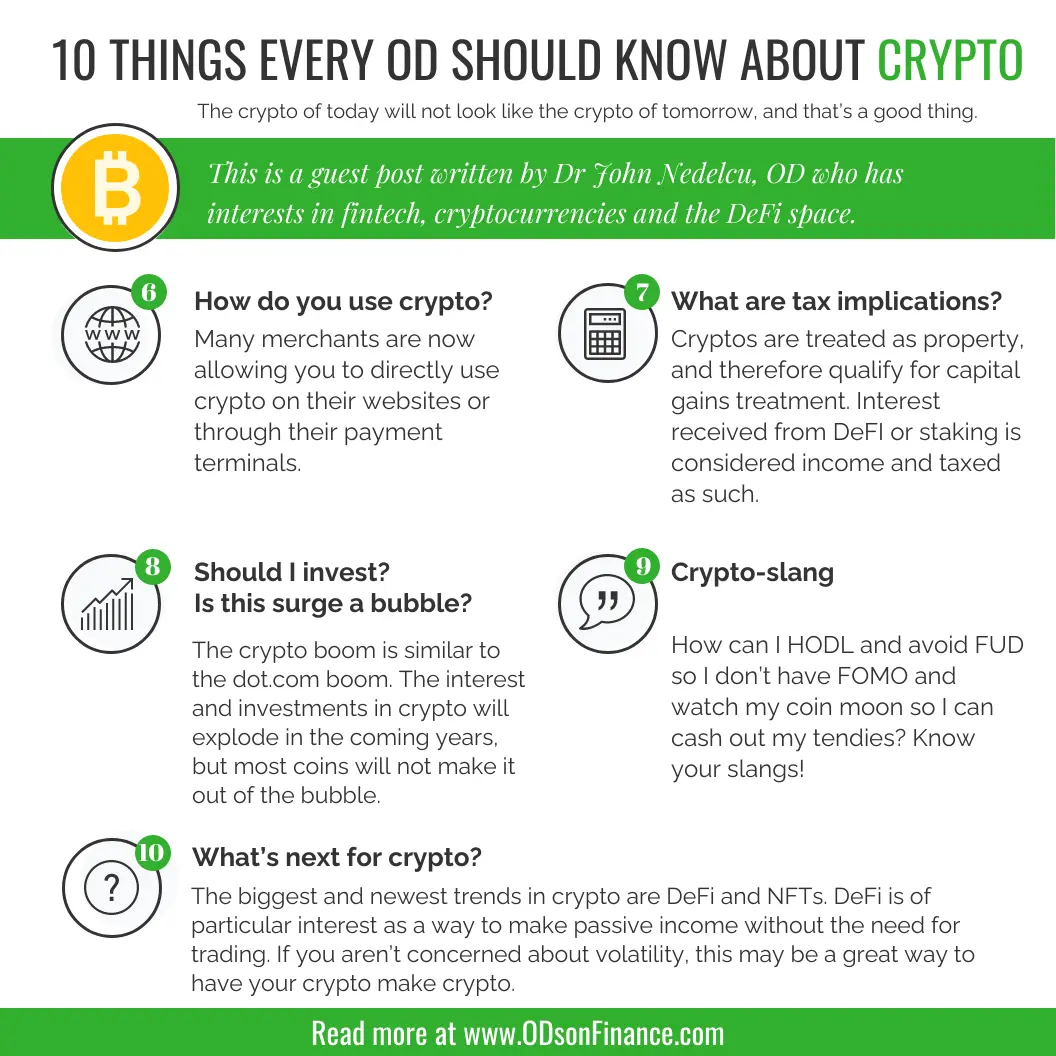Ten Things Every OD Should Know About Crypto

Editor's Note: This is a guest post written by Dr John Nedelcu, OD who has interests in fintech, cryptocurrencies and the DeFi space. He started investing in crypto in 2013 with most of his interest around BTC, ETH, XRP, NEO, NANO and several other smaller projects.
Aaron and Dat are extremely strict about guest requirements in that they must be educational and informative to our readers. Every guest post is vetted, read and upheld to the highest standards of ODsonFinance. Your trust is the most valuable factor to us. We like having experts in their field write on our website, enjoy and give us feedback!
KEY POINTS:
-
(1) Cryptocurrency is a digital asset that utilizes an open and decentralized ledger along with cryptography to secure the validity of transactions, create new coins/tokens and destroy old coins/tokens.
-
(2) Most cryptocurrencies use a blockchain (or similar structure) on an open ledger. Blocks are transactions that are linked together with cryptography
-
(3) There are now thousands of coins and tokens. Coins are currencies that have their own unique separate blockchain. Tokens can also be a store of value but tend to be used for utility.
-
(4) Cryptocurrencies are generally purchased through exchanges like Coinbase and Gemini. You can also purchase coins directly from other people
-
(5) You can store your crypto a myriad of ways. The most common are: keeping them on the exchange, storing them on a digital wallet, storing them in a hardware wallet or storing them on paper.
-
(6) Many merchants are now allowing you to directly use crypto on their websites or through their payment terminals.
-
(7) Generally, any time you use, trade or cash out crypto, you create a taxable event. Cryptos are treated as property, and therefore qualify for capital gains treatment. Interest received from DeFI or staking is considered income and taxed as such.
-
(8) I believe the crypto boom is similar to the dot.com boom. I think the interest and investments in crypto will explode in the coming years, but most coins will not make it out of the bubble. But, like the dot com bubble, we will get great cryptos that are analogous to Google, Amazon and Yahoo and are now some of the most prosperous investments of that time period.
-
(9) Crypto-slang: How can I HODL and avoid FUD so I don’t have FOMO and watch my coin moon so I can cash out my tendies? Know your slangs!
-
(10) The biggest and newest trends in crypto are DeFi and NFTs. DeFi is of particular interest as a way to make passive income without the need for trading. If you believe certain cryptos will increase over time and aren’t concerned about volatility, this may be a great way to have your crypto make crypto.
As a company and forum founded in the fundamentals of investing, ODs on Finance has always sought to educate its audience on tried and true, historically and statistically proven investing strategies. However, in the modern age we are living in, the landscape of investing is changing. The relatively new asset class of cryptocurrency has raised a conundrum of mixed opinions and for good reason. While cryptocurrency as a whole lacks intrinsic value, and is tough to justify as an investment (based on the traditional definition of an investment); its wild volatility fueled by speculation has the capacity to make individuals extremely rich or dirt poor. This has led to quite a bit of public interest in learning about and purchasing cryptocurrency. We have always believed that education is paramount to anything related to finance, so we enlisted one of our members and cryptocurrency enthusiast, Dr. John Nedelcu, to provide us with a primer on everything crypto-related. Enjoy the article below and feel free to ask questions!
-Dr. Aaron Neufeld, Co-Founder
(1) What is a cryptocurrency?
Cryptocurrency is a digital asset that utilizes an open and decentralized ledger along with cryptography to secure the validity of transactions, create new coins/tokens and destroy old coins/tokens. A true cryptocurrency is not owned by one person or group (i.e. decentralized) - transactions are broadcasted publicly for confirmation and scrutinization (i.e. open ledger), and confirmed using cryptographic methods, among other means.
(2) How are transactions verified/accounted for?
Most cryptocurrencies use a blockchain (or similar structure) on an open ledger. Blocks are transactions that are linked together with cryptography. Each block contains transactional data, time stamps and data about the previous block. This data is confirmed over many ledgers across a network of decentralized (not directly networked together) computers to confirm the validity. If one person or group were to try and change the ledger, it would not match the other ledgers on the network and therefore would not be validated.
(3) What are the different types of coins/tokens? What is a Coin vs a Token?
There are now thousands of coins and tokens. The top coins and tokens are tracked and ranked by market share on coinmarketcap.com (my favorite), among other sites. Coins are currencies that have their own unique separate blockchain. Bitcoin (BTC) and Ethereum (ETH) are coins. You cannot complete a transaction for BTC on the ETH network and vice versa. Tokens are built off the “smart contract” feature of certain coins like ETH (more on this later). Popular tokens include MANA, BAT and BNB. All three tokens are transacted on the ETH network.
Coins are generally a store of value, but can also offer the ability to execute smart contracts. A smart contract is basically a computer program that is on the open-decentralized ledger of certain cryptocurrencies (Ethereum being the most popular) that execute actions when certain conditions are met.
Tokens can also be a store of value but tend to be used for utility. Popular uses for tokens include: voting rights, access to digital merchandise, representation of a physical piece of merchandise, access to certain networks and more.
(4) How does someone acquire crypto?
Cryptocurrencies are generally purchased through exchanges like Coinbase and Gemini. You can also purchase coins directly from other people. There are also crypto-ATMs, which essentially work like an exchange, but with cash rather than a bank transfer. You can “mine” most cryptos by being part of the network that does the computing to confirm transactions.
However you get crypto, make sure that you have the “private keys” to the coin. Any exchange that lets you transfer a given coin off their website/database and move it to your own database is giving you the private key to your coin. Most exchanges work this way. Examples include Coinbase, Binance, Abra and Gemini. Certain exchanges like Robinhood, however, do not allow you to move the coin. In essence, they own the coin and are letting you hold on to it until you want to sell or trade it, but it’s never truly in your possession. What happens to that IOU if they run out of liquidity? Avoid exchanges that don’t let you move your crypto.
(5) How does someone store crypto?
You can store your crypto a myriad of ways. The most common are: keeping them on the exchange, storing them on a digital wallet, storing them in a hardware wallet or storing them on paper. I’ll break down the pros and cons of each below:
-
(1) Exchange
Storing them on the exchange you bought them
Pros: Easy to quickly trade, move or cash out at a moments notice
Cons: Your coins are on an online database that people are trying to compromise daily. There have been numerous crypto-database breaches where people lost their assets. Even if the exchange has the most secure encryption on the planet, if you’re phished, you can still lose your coins through no fault of theirs.
-
(2) Digital Wallet
Storing them on your phone or computer
Pros: Mostly easy to trade, move or cash out, not on a large database that people are targeting daily, only you have access
Cons: If not set up securely – can be easy to be hacked, if you lose/damage the device it may be difficult or impossible to recover the coins, may take longer to move in volatile markets
-
(3) Hardware wallets
-
(4) Paper wallet
Literally a piece of paper that you write you private key and seed on
Pros: Cheap, secure (if in a safe or bank vault)
Cons: Easy to lose or destroy, slowest time to move the assets
(6) How does someone use crypto?
Many merchants are now allowing you to directly use crypto on their websites or through their payment terminals. You can also get crypto-debit cards where you can convert any crypto to cash and pay with the card. You can pay for goods or services with your crypto to any person that also has a crypto wallet, similar to how you Venmo someone.
(7) What are the tax implications of keeping and trading crypto?
Talk to your CPA (In need of a CPA, check out our vetted Recommended CPA partners) to get more specifics. Generally, any time you use, trade or cash out crypto, you create a taxable event. Cryptos are treated as property, and therefore qualify for capital gains treatment. Interest received from DeFI or staking is considered income and taxed as such.
(8) Should I invest? Is this recent surge a bubble?
Yes? No? Maybe? No one knows, but I believe the crypto boom is similar to the dot.com boom. I think the interest and investments in crypto will explode in the coming years, but most coins will not make it out of the bubble. But, like the dot com bubble, we will get great cryptos that are analogous to Google, Amazon and Yahoo and are now some of the most prosperous investments of that time period.
Maybe the government steps in and ruins the fun for everyone? I suspect this is less likely to happen as many institutional investors and companies like JP Morgan Chase, Visa, Mastercard…etc are now invested in the success of certain cryptos.
(9) Crypto-slang: How can I HODL and avoid FUD so I don’t have FOMO and watch my coin moon so I can cash out my tendies?
-
HODL
Some people believe this a misspelling of “HOLD” while others believe it’s an abbreviation for “hold on for dear life.” Either way, it means to keep your coins and not sell during volatility
-
FUD
Fear, uncertainty and doubt. Basically any negative news about a coin is considered FUD
-
FOMO
Fear of missing out
-
To The Moon
Describes the upward financial trajectory of a coin in hopes that it “reaches the moon” and realizes it’s full value as perceived by it’s holders (or hodlers)
-
Tendies
This is more of a wall street bets (WSB Reddit) term - the profits you take from the investment
-
Airdrop
Giveaways of crypto to wallets for marketing or promotion
-
Faucet
Earn small amounts of crypto by completing small tasks, usually to help promote the use of a coin. In 2010, there was a bitcoin faucet giving away as many as 5 bitcoins (now ~$275,000 USD) at a single time for doing essentially nothing.
-
DeFi
Decentralized Finance. Borrow, lend and collect interest through the use of smart contracts without the need of banks or middlemen.
-
NFT – Non-fungible token
These are unique (non-fungible = non-replaceable) assets that are confirmed and tracked through a blockchain network, mostly on the Ethereum network. These are generally used to own art, music or other forms of creativity.
-
Staking
Loaning your crypto assets to an institution/exchange. They will generally use it for liquidity or to help increase the price of the asset by locking it in a smart contract for a period of time. You get interest in exchange and your asset back after a period of time.
(10) What’s next for crypto?
The biggest and newest trends in crypto are DeFi and NFTs. DeFi is of particular interest as a way to make passive income without the need for trading. If you believe certain cryptos will increase over time and aren’t concerned about volatility, this may be a great way to have your crypto make crypto.
NFTs are interesting in the fact that you get to own something that’s on the blockchain plus they are tangible to a certain degree. NFTs have been selling for absurd amounts of money. To date, the record goes to a collection of digital art called “Everydays: The First 5000 Days” by Beeple for $69,346,250. Not a typo. The NBA is even getting involved. You can now buy NBA Top Shot “Moments” like you would buy a pack of basketball cards back in the day. These “moments” are short video clips of memorable plays by NBA players throughout the year. There is a finite amount of moments and some are rarer than others. People can sell their moments on the Top Shot Marketplace for cash or crypto. NBA Top Shot uses the Flow blockchain.
The crypto space is evolving and changing on a daily basis, and that’s the beauty of cryptocurrency – it’s not stagnant, it evolves with changes in technology and with threats to it’s blockchain. Some of the biggest names in crypto, like Bitcoin and Ethereum, have updated their networks multiple times to make their coin more secure or easier to use. The crypto of today will not look like the crypto of tomorrow, and that’s a good thing.
Want to learn how to build your own portfolio? Check out The Optometrist's Guide to Investing 101
Want to get a full blueprint on How to start? Buy our Book The Optometrist's Guide to Financial Freedom
Related Articles
- « Previous
- 1
- 2
- 3
- 4
- Next »




Facebook Comments